Diplomatic Bluebook 2018
Chapter 3
Japan's Foreign Policy to Promote National and Global Interests
3 Promoting Resource Diplomacy along with Foreign Direct Investment in Japan
(1) Securing a Stable Supply of Energy and Mineral Resources at Reasonable Prices
A Current Situation of Energy and Mineral Resources at Home and Abroad
(A) Situation in the World
Crude oil prices had remained at the high level of around 100 US dollars/barrel since the end of 2010, reflecting factors such as increased energy demand centered on emerging countries, the rise of resource nationalism, and geopolitical risks in the Middle East. However, since the second half of 2014, crude oil prices have fallen significantly on the back of sluggish demand in China and other countries due to a slowdown in the economy, increased production of shale oil in the U.S., the sustained high-level production in major oil producing countries, excess supply and the high levels of inventory accompanying that. By February 2016, prices fell at one point to as low as 30 US dollars/barrel. Thereafter, prices rose as a result of observations of the tightening of supply and demand in the second half of the year. After OPEC member states and major oil producers that are not members of the OPEC agreed, at the end of the year, to coordinate and reduce production by approximately 1.8 million barrels per day, prices have generally stabilized at around 50 US dollars/barrel.
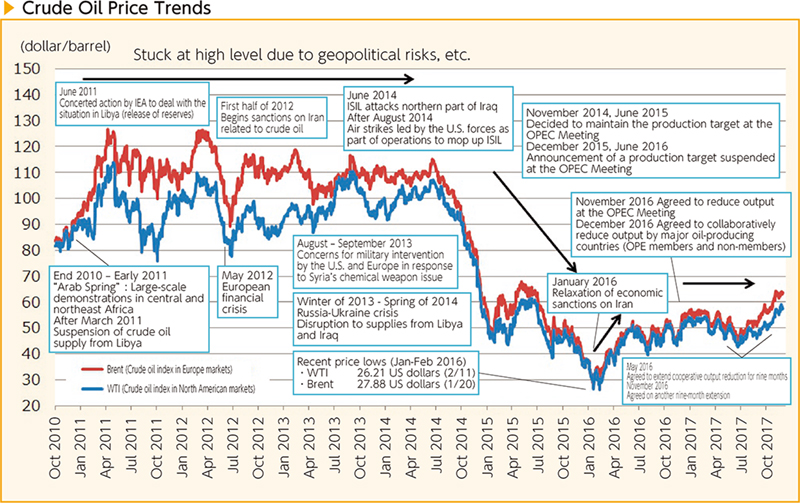
In the second half of 2017, growth in demand accompanying strong economic growth and coordination among major oil producers to reduce production contributed to a fall in the high level of oil stocks, and this in turn contributed to a rising trend in the prices due to the tightening of the demand and supply environment. The re-extension of a coordinated reduction in production decided on at the OPEC meeting held at the end of November 2017, geopolitical risks such as the uncertain situation in the Middle East, as well as increased shale oil production in the U.S. that could potentially inhibit the rise in crude oil prices are some of the issues that bear watching.
On the other hand, according to the International Energy Agency (IEA), although the amount of upstream investment for oil and gas worldwide in 2016 declined for two consecutive years in 2015 and 2016, the amount for 2017 is expected to exceed that of the previous year slightly, driven by the significant increase in the amount of investment in shale oil in the U.S. brought about by the decline in investment costs.
(B) Situation in Japan
After the Great East Japan Earthquake, the proportion of fossil fuels among Japan's power generation sources rose from about 65% before the earthquake to about 85%, as a result of the suspension of the operation of nuclear power stations. In particular, the proportion of liquefied natural gas (LNG) has been on the rise. At the same time, Japan's primary energy self-sufficiency ratio (including nuclear power), which relies heavily on overseas imports for virtually all its oil, natural gas, and coal, fell significantly from 20% before the earthquake to 8%. Furthermore, more than 80% of Japan's crude oil imports come from the Middle East. In light of this situation, efforts to secure stable and cheap supplies of energy are becoming increasingly important. Against this backdrop, the Long-term Energy Supply and Demand Outlook (Energy Mix) was decided upon in July 2015. This Outlook, which presents the ideal vision for energy supply and demand, serves as a forecast of the future energy structure that should be realized when measures are put in place based on the basic direction of policies, based on the assumption of policy goals that should be achieved in the aspects of stable supply, economic efficiency, environmental compliance, and safety (3E + S), which are the basic perspectives of the energy policy, and taking into account the Basic Energy Plan approved by the Cabinet in April 2014. In August 2017, discussions commenced on the review of the Basic Energy Plan.
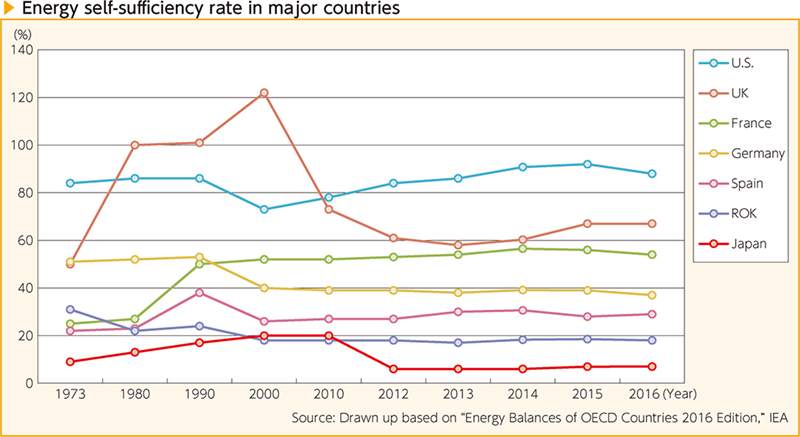
B Diplomatic Efforts to Secure a Stable Supply of Energy and Mineral Resources at Reasonable Prices
Securing a stable supply of energy and mineral resources at reasonable prices forms the foundation for the vital economy of Japan and the livelihoods of its people. Japan has been strengthening diplomatic efforts, focusing on the following activities.
(A) The Foreign Minister's Policy Speech on Japan's New Energy and Resource Diplomacy
To present its vision and strategy on Japan's new energy and resource diplomacy, MOFA published the Foreign Minister's policy speech entitled “Energy and Resource Diplomacy of Japan – global vision for a shared future.” This speech was read by Parliamentary Vice-Minister for Foreign Affairs Takisawa on behalf of the Minister at the international symposium on “Energy Security and Investment in Asia” hosted by MOFA in July 2017.
This speech sets out Japan's future vision for energy and resource diplomacy, as well as its strategies towards the realization of this vision. Specifically, it states that Japan's efforts will focus on “three pillars”: (1) Strengthen the strategic approach to energy and resource issues as part of Japan's diplomacy; (2) Take a multi-layered approach when conducting energy and resource diplomacy so that Japan can provide solutions to diverse needs; and (3) consolidate “Japan's unique strengths” and apply them in the field of energy and resources.
(B) Strengthening Comprehensive and Mutually-Beneficial Ties with Resource-Rich Countries
In order to secure a stable supply of energy and mineral resources, Japan has been making efforts to strengthen comprehensive and mutually-beneficial ties with resource-rich countries by approaching them at the leaders' and ministerial level, and offering cooperation utilizing its ODA, including technical cooperation and human resources development in the resource sector. In particular, since the inauguration of the Abe Administration, the Prime Minister and Foreign Minister have engaged in proactive resource energy diplomacy, visiting major resource-rich countries such as North America, the Middle East, Africa, Central and South America and the Asia-Pacific region.
(C) Ensuring Security of Transportation Routes
Piracy incidents have been occurring along the sea lane stretching from the Middle East to Japan, through which approximately 80% of the total oil imports to Japan passes, and along other internationally important sea lanes such as those off the coast of Somalia and the Gulf of Aden. In response to this situation, Japan has supported the coastal countries through such measures as supporting the capacity building for maritime law enforcement, cooperating on information sharing among countries concerned, and developing navigation facilities. Japan has also been dispatching units of the Japan Self-Defense Forces and Japanese Coast Guard officers to areas off the coast of Somalia and the Gulf of Aden to engage in escort operations of ships from all over the world (See 3-1-3(4) Oceans and Seas).
(D) Gathering and Analysis of Resource-Related Information at the Diplomatic Missions Overseas
With a view to strengthening the function of the diplomatic missions overseas, “Special Assistants for Natural Resources” have been assigned to 60 diplomatic missions overseas in 53 countries to work intensively on the acquisition and stable supply of energy and mineral resources (as of the end of December 2017). Furthermore, MOFA holds “Strategy Meetings on Natural Resources” every year, which bring together officials who are assigned to the diplomatic missions overseas in countries that are important in terms of ensuring a stable supply of energy and mineral resources. In 2017, the Meeting was held in Tokyo in February, and was also attended by representatives of the relevant ministries and private-sector agencies. Active discussions were held on the international situation surrounding energy and mineral resources, as well as on the direction of Japan's strategies corresponding to the international situation.
(E) Making Use of International Fora and Rules
Japan makes active use of international fora and rules to cooperate with the international community towards maintaining a stable supply of energy. Japan endeavors to strengthen its capability to respond to emergencies such as disruptions in oil supply, while striving to quickly and accurately grasp information, such as trends in the global energy markets and resource-producing countries, and revisions to the medium and long-term outlooks for supply and demand.
The G7 Energy Ministerial Meeting was held in Rome, Italy, on April 9 and 10. Taking into account the international energy situation, which has entered a period of significant change in recent years, discussions were held on the role of natural gas, the shift towards low-carbon energy, and improvements to energy access in Africa. Italy, as the chair of the Meeting, issued the Chair's Summary “Energy Security: from Rome 2014 to Rome 2017.”
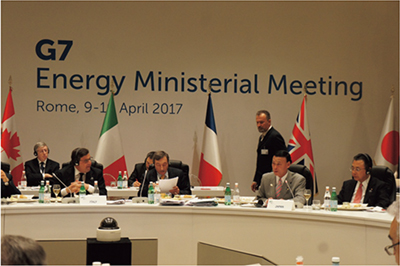 Parliamentary Vice-Minister for Foreign Affairs Takisawa attending the G7 Energy Ministerial Meeting in Rome (April 9, Rome, Italy)
Parliamentary Vice-Minister for Foreign Affairs Takisawa attending the G7 Energy Ministerial Meeting in Rome (April 9, Rome, Italy)At the G20 Hamburg Summit held in Hamburg, Germany in July, the leaders affirmed their close cooperation on making the economic and energy systems consistent and aligned with the 2030 Agenda, and their continued efforts to develop an open, flexible, and highly transparent market for energy products and technology, in order to ensure energy security. In addition, the Climate and Energy Action Plan for Growth was adopted as an annex to the Leaders' Declaration.
At APEC, the APEC Energy Working Group (EWG) is convened as a framework to promote energy trade and investment and strengthen energy security, so as to contribute to the sustainable economic growth of the Asia-Pacific region. The 53rd EWG was held in Singapore in April 2017, and the 54th EWG was held in New Zealand in November. Japan participated actively in both meetings.
In relation to ASEAN, the ASEAN+3 (Japan, China, and ROK) Ministers on Energy Meeting and the East Asia Summit (EAS) Energy Ministers Meeting were held in Manila, the Philippines in September. At the 2017 meeting, the respective countries agreed to put effort into promoting investment, human resource development, and the development of legal systems in the field of LNG, in order to build a highly transparent and fluid LNG market. Furthermore, Japan proposed the strengthening of precise energy conservation cooperation that matches the levels of progress of each ASEAN country, and this proposal was received with gratitude from the respective countries.
C Oceans and Seas (continental shelves and deep seabed)
As Japan is not abundant in energy and mineral resources on its land, marine living resources and natural resources in the continental shelf and the sea-bed and ocean floor and subsoil thereof beyond the limits of national jurisdiction (the Area) in the surrounding waters are important, from the perspective of securing stable supply sources and ensuring the sound development of the economy. Japan is proceeding with necessary measures to secure its interests at sea based on the United Nations Convention on the Law of the Sea (UNCLOS). Toward the establishment of its outer limits of the continental shelf beyond 200 nautical miles, Japan received the recommendations from the Commission on the Limits of the Continental Shelf (CLCS) in April 2012, in which four out of seven regions that Japan made its submission to the CLCS, were recognized. Following this, in October 2014, Japan established extended continental shelves in two regions in accordance with the “Future Policy for Extending the Continental Shelf” decided by the Headquarters for Ocean Policy in July of the same year. Japan is also coordinating with a state concerned regarding another two regions and is making continuous efforts for early recommendations of the remaining one region, on which recommendations were deferred (See 3-1-6).
With regard to deep seabed, two Japanese contractors concluded contracts with the International Seabed Authority (ISA) and gained exclusive rights to explore for deep-sea mineral resources in a designated exploration area in search of manganese nodules15 and cobalt-rich ferromanganese crusts16.
- 15 Black agglomerate precipitate that contains much copper, nickel, and cobalt
- 16 Ocean floor mineral resources with a high percentage of cobalt content, and present on the slopes and tops of sea mounts
D Efforts toward Green Growth and a Low Carbon Society
Japan has been making contributions toward the realization of green growth and the promotion of a low-carbon society in the international community, including in developing countries (e.g., in human resources development and cooperation through international frameworks) through the use of renewable energy (solar, wind, biomass, geothermal, hydraulic, the use of the oceans, etc.) and promotion of energy-efficient technologies. With a view to disseminating and promoting the sustainable use of renewable energy, Japan has been engaged actively in the International Renewable Energy Agency (IRENA) and served as President of the Assembly in January 2015. Moreover, in March 2016, Prime Minister Abe announced the “Fukushima Plan for a New Energy Society”17 to promote Fukushima as the center of research into renewable energy. Based on this plan, MOFA organized a study tour in August 2016 of the “Fukushima Renewable Energy Institute,” and a study tour of the Nakoso Power Station and other reconstruction-related facilities in June 2017 for ambassadors of each country in Tokyo. The tours promoted Japan's proactive stance toward the spread and promotion of renewable energy externally.
In recent years, dramatic changes that could even be described as cataclysmic have been taking place in the global energy landscape. Firstly, there has been “the shift in suppliers” with the rise of new energy exporters such as the U.S. as a result of technological innovation such as the shale revolution. Secondly, there has also been “the shift in consumers” as the center for rising energy demand moves towards emerging economies, in particular Asian countries such as India, China, and ASEAN member states. Thirdly, as climate change becomes a common challenge faced by all countries in the world, the wave of “the shift towards low-carbonization” has been applying pressure on the energy sector, which makes up more than two-thirds of the greenhouse gas emissions generated in the world. Moreover, policy trends in countries around the world including changes of the energy policy under the Trump administration in the U.S. are also drawing attention to the impact they may have on the global energy situation.
Responding to such changes in the international situation, Japan is fully aware of the need for its energy and resource diplomacy. With this awareness, in 2017, MOFA conducted in-depth discussions on how to reshape Japan's energy and resource diplomacy, harnessing the opportunities such as meetings involving Special Assistants for Natural Resources deployed in Japan's diplomatic missions all around the world. Taking into account the outcome of the discussions, a new vision and strategy were unveiled in July entitled “Energy and Resource Diplomacy of Japan – global vision for a shared future.”
Given Japan's limited resources, securing a stable supply of energy and resources continues to be a greatly important issue. However, it is difficult for any country to achieve energy security on its efforts alone under the current international situation; rather, there is a need to consider an approach for energy and resource diplomacy on the premise of mutual dependence. The Global Vision sets out five points of particular emphasis (refer to the chart below), based on the idea that contribution to providing solutions for global key issues concerning energy will assure Japan's own energy security. “Win-win” relationships with resource-rich countries will be strengthened by making Japan's utmost efforts to achieve this vision, eventually leading to a stable supply of energy and resources to Japan. At the same time Japan can demonstrate leadership in strengthening energy security in the world. In addition, towards realizing this vision, Japan has also announced that it will focus on “three pillars” (refer to the chart below) as the core of its “Roadmap for a strengthened energy and resource diplomacy.”
Energy and resource security is a challenge not only for Japan, but also for the world, and is directly connected to economic, social, and environmental issues on a global scale. MOFA will continue to take a proactive approach towards energy and resource diplomacy, based on the stance set out in the Global Vision.
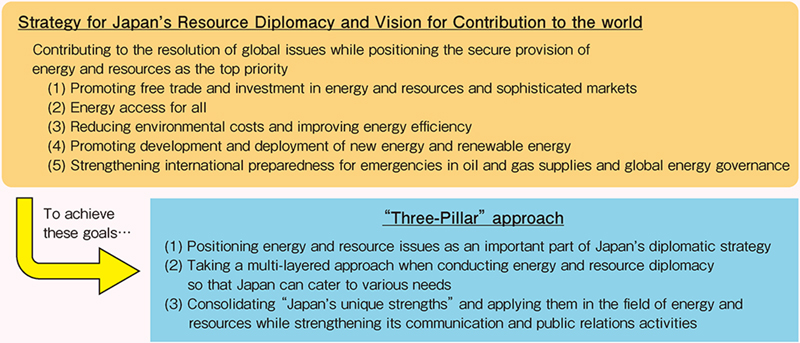 Five points and three pillars of the Global Vision
Five points and three pillars of the Global Vision- 17 Plan based on Prime Minister Abe's initiative to create a model in Fukushima for the realization of a future new energy society, while providing the world with information on this model, and establishing Fukushima as a pioneering location with regard to renewable energy and the future hydrogen society.
(2) Ensuring Food Security
According to reports by the UN Population Division, global population in 2017 is estimated to be about 7.6 billion. However, global population is expected to increase mainly in Sub-Saharan Africa and South Asia in the future, and to reach about 9.8 billion by 2050. Furthermore, as demand for grains will double with the increase in consumption of livestock, demand for feed for livestock will also increase rapidly in tandem with the rise in the amount of livestock consumed, should dietary habits in developing countries change in the future. According to a report by the Food and Agriculture Organization (FAO) in 2017, there is a need to increase food production by approximately 50% by 2050, against food production levels in 2012. On the other hand, if we were to turn our eyes to the domestic situation in Japan, while the country's food self-sufficiency rate (calorie basis (published by the Ministry of Agriculture, Forestry and Fisheries)) has been on a downward trend in the long-term, it has been levelling out in recent years, and reached 38% in FY2016. Japan continues to be dependent on the import of much of its food over the long-term; in order for Japan to avoid the problem of food supply shortage, it needs to increase domestic food production, and at the same time, actively promote food production worldwide in order to ensure the stability of imports. In the event that global food supply falls short due to a large-scale drought or other factors, it is also necessary for Japan to contribute as a member of the international community, including providing support to other countries. Furthermore, rather than temporarily increasing food production amidst rising food demand, there is a need to secure the sustainability of increased food production while reducing the burden on the environment. In addition, food also suffers from quality deterioration over time, and is easily damaged by diseases and pests. As such, to ensure the efficient consumption of agricultural produce, it is necessary to create stable markets for agricultural products as well as trading systems, and to improve logistics. It is vital to consolidate Japan's food security through these efforts.
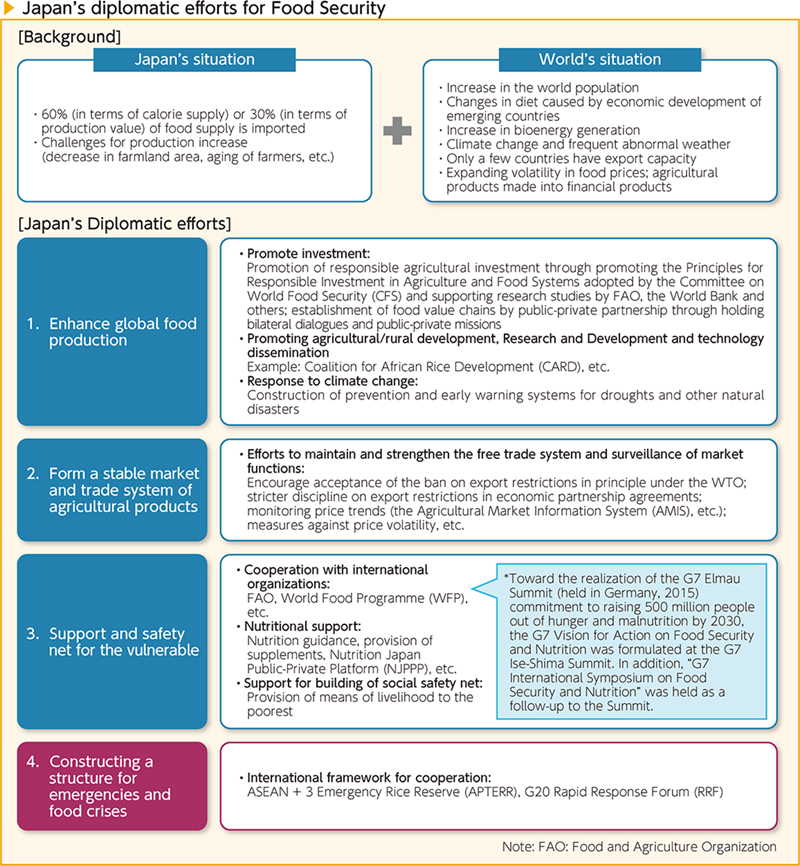
A Efforts in the International Frameworks Concerning Food Security
In the G7/G8 frameworks, since the topic of food security was raised at the Toyako Summit held in Hokkaido in 2008, various initiatives have been implemented to strengthen food security. At the G7 Taormina Summit (Italy) held in May 2017, food security was brought up as an important issue; in particular, a decision was made to enhance joint support towards food security, nutrition, and sustainable agriculture in Sub-Saharan Africa. At the G7 Agriculture Ministers' Meeting held in October 2017 (Italy), the focus was placed on strengthening the resilience of farmers and the development of agricultural communities. Discussions were held on risk management policies in agriculture and the tools for disaster prevention and countermeasures, as well as food security and the increasing number of refugees.
In the G20 framework, at the G20 Agriculture Ministers' Meeting held in Germany in January 2017, the ministers agreed to take serious responsibility for realizing agriculture-related goals aimed at ensuring food security and improving nutrition around the world, including the second goal of the Sustainable Development Goals (SDGs) (End hunger, achieve food security and improved nutrition and promote sustainable agriculture). They also affirmed their commitment towards the regular convention of the G20 Agriculture Ministers' Meeting, and the implementation of action plans.
There has also been progress in regional cooperation. In APEC, the relevant cooperation has been ongoing through the APEC Policy Partnership on Food Security (PPFS), which involves cooperation not only among the agencies of the participating countries and regions, but also with their private sectors. In August, the APEC High Level Policy Dialogue on Food Security and Sustainable Agriculture in Response to Climate Change was held in Viet Nam, where the Can Tho Statement On Enhancing Food Security and Sustainable Agriculture in Response to Climate Change, the Food Security and Climate Change Multi-Year Action Plan, and the Action Plan on Rural - Urban Development to Strengthen Food Security and Quality Growth, were adopted.
The ASEAN Plus Three Emergency Rice Reserve Agreement (APTERR) entered into force in 2012, under the cooperative framework of ASEAN+3 (Japan, China, and ROK). Based on this, Japan provided the Philippines and Cambodia with assistance in rice supply in 2016. At the ASEAN+3 Summit Meeting held in Manila, the Philippines, in November 2017, the Statement on Food Security Cooperation was adopted.
B Japan's Efforts to Promote “Responsible Agricultural Investment”
While promoting international agricultural investments aimed at increasing global food production, large-scale “land grabbing” in developing countries has been a concern. In light of this issue, Japan advocated the concept of “Responsible Agricultural Investment” at the G8 L'Aquila Summit held in Italy in 2009, so that investments would be promoted in a manner to create a triple win situation for recipient countries, local communities, including smallholders, and investors. In April 2010, four relevant international organizations (FAO, IFAD, the United Nations Conference on Trade and Development (UNCTAD), and the World Bank (WB)) adopted the “Principles for Responsible Agricultural Investment (PRAI). Building on this, the “Principles for Responsible Investment in Agriculture and Food Systems” was adopted at the general assembly of the Committee on World Food Security (CFS) in October 2014. At the G7 Ise-Shima Summit in 2016, these principles were also incorporated into the “G7 Vision for Action on Food Security and Nutrition,” forming the basis for actions to be taken by G7 countries. Japan will continue to lead the execution of these principles as the main issues in realizing worldwide food security.
(3) Fisheries (Including Tuna and Whaling Issues)
Japan is one of the major fishing and consuming countries of marine products in the world and plays an active role in the proper conservation, management and sustainable use of living marine resources.
Japan, as one of the largest tuna-consuming countries, has joined all Regional Fisheries Management Organizations (RFMOs) for tuna, and leads discussions on strengthening measures for the conservation and management of the resources. In 2017, at the annual meeting of the Western and Central Pacific Fisheries Commission (WCPFC), conservation and management measures that enable changes in catch quotas, based on the results of resource evaluations on Pacific bluefin tuna and the extent of changes in the probability of achieving the interim recovery target, were adopted. With regard to bigeye tuna, yellowfin tuna, and skipjack tuna, the prohibition period for fish aggregating devices (FAD) was reduced for purse seine fishery, and new regulations on the limit for the number of FAD were established, as temporary measures for a one-year period in 2018. With regard to longline fishing, measures that include increasing Japan's catch quota for bigeye tuna from 16,860 tons to 18,265 tons, were adopted. At the annual meeting of International Commission for the Conservation of Atlantic Tunas (ICCAT), an agreement was reached to increase the total allowable catch (TAC) for Atlantic bluefin tuna resources gradually from the existing 23,655 tons to 36,000 tons by 2020.
In the North Pacific Fisheries Commission (NPFC), discussions were carried out based on Japan's proposals, and decisions were made on the following matters: (1) For Pacific saury, measures to prohibit an increase in the number of vessels permitted to fish in deep-sea fishery countries and regions (limited for one year); (2) For mackerel, completion of resource evaluation as soon as possible, and during that time, measures to prohibit an increase in the number of fishing vessels permitted to fish for mackerel in international waters; (3) To place 23 non-flag vessels on the list of illegal, unreported, and unregulated (IUU) fishing vessels. Japan recognizes the importance of the role of the Agreement on Port State Measures to Prevent, Deter and Eliminate Illegal, Unreported and Unregulated Fishing (entered into force in 2016), which provides for the adoption of measures on denying the entry of IUU vessels into ports of calls, on countermeasures against IUU fishing vessels. In May 2017, Japan deposited its instrument of accession, and the Agreement entered into force for Japan in June.
With regard to the Japanese eel (Anguilla japonica), which was also discussed at the 17th meeting of the Conference of the Parties (CoP17) to the Convention on International Trade in Endangered Species of Wild Fauna and Flora (CITES), the 10th Informal Consultation was held in June 2017. Four countries and regions, namely Japan, China, Taiwan, and the ROK, are strengthening initiatives to build an international management system, such as by issuing the joint press release that includes reviews on the management measures adopted by each of the countries or regions.
While conditions at the high seas of the Arctic Ocean are not suitable for direct commercial fishery soon, there have been growing concerns on future unregulated fishing there with the partial melting of the ice due to global warming. Against this background, Meetings on High Seas Fisheries in the Central Arctic Ocean have been held six times since December 2015, involving nine countries and one organization: the five Arctic coastal countries (Canada, Denmark, Norway, Russia, and the U.S.), Japan, China, the ROK, Iceland, and the EU. At the sixth meeting in November, an agreement in principle was reached on the draft agreement, which covers contents such as the prevention of unregulated fishing.
Regarding the whaling issue, under the basic policy of pursuing the resumption of commercial whaling by conducting scientific whale research programs, based upon scientific evidence and international law in order to gather scientific data that is necessary for the proper management of whale resources, Japan has been implementing the “New Scientific Whale Research Program in the Antarctic Ocean (NEWREP-A)” since December 2015, which was finalized taking into account the Judgment of the International Court of Justice (ICJ) in March 2014 as well as issues pointed out by the Scientific Committee of the International Whaling Commission (IWC). Moreover, regarding the western North Pacific, a proposal for the “New Scientific Whale Research Program in the Western North Pacific (NEWREP-NP)” was submitted to the Scientific Committee of the IWC in November 2016. The research program was finalized fully taking into account the discussions within the Scientific Committee in May 2017, and the research program was implemented from June 2017. Anti-whaling countries occupy the majority at the IWC, and while the international situation regarding whaling still remains difficult, Japan is making persistent efforts to deepen understanding among the international community based on scientific evidence and international law.
The Food and Agriculture Organization of the United Nations (FAO) is the leading United Nations' specialized agency in the fields of food, agriculture, forestry and fisheries, and plays an important role in strengthening food security around the world. Since it became a member of FAO in 1951, Japan has maintained its cooperative relationship with the organization for many years. Recently, Japan is working toward a further strengthening of relations with FAO, with a focus on efforts to have closer consultations with FAO, to make information on FAO's activities more readily available in Japan, and to increase the numbers of Japanese employees at FAO.
In January 2017, the first Japan-FAO Strategic Consultation Meeting was held at FAO Headquarters in Rome. Looking back at many years of collaboration, Japan and FAO reaffirmed the importance of further advancing their strategic partnership to address major challenges and opportunities related to food security, nutrition, agriculture, forestry and fisheries, as they move towards the achievement of the Sustainable Development Goals (SDGs). The two sides also discussed how to further boost the visibility of the FAO's mandate, work and achievements in Japan.
Following this first Strategic Consultation Meeting, FAO Director-General Graziano da Silva visited Japan in May for the first time in four years. During his stay, he held dialogues with key government officials including Foreign Minister Kishida, attended various events in Tokyo, visited a site designated as Globally Important Agricultural Heritage Systems (GIAHS) in Gifu Prefecture, and gave interviews to various media outlets as a part of their active efforts to spread information about overview and importance of FAO's activities.
With the aim of increasing the number of Japanese employees at FAO, Director-General Graziano da Silva also delivered a lecture at Sophia University, where he spoke about FAO's role in increasing food production, improving nutrition and promoting sustainable agriculture and fisheries, as well as about the appeal and rewarding aspects of working at FAO to Japanese youths, and contributed to potential candidates for FAO employees.
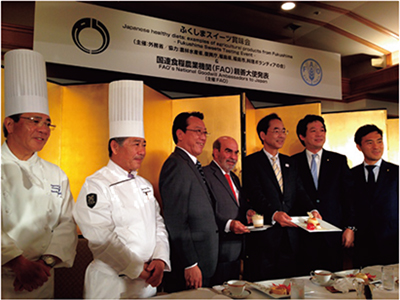 Introducing sweets at the Fukushima Sweets Tasting Event (May 10, Tokyo)
Introducing sweets at the Fukushima Sweets Tasting Event (May 10, Tokyo)Director-General Graziano da Silva also tasted sweets made from fruits produced in Fukushima City at the Fukushima Sweets Tasting Event organized by MOFA. He highly appraised the safe and delicious agricultural products of Japan, and explained that food products from Fukushima are safe and that there is no need to raise concerns about safety. In this way, he provided support for Fukushima's reconstruction to counter the reputation damage caused upon food and agriculture products following the Great East Japan Earthquake.
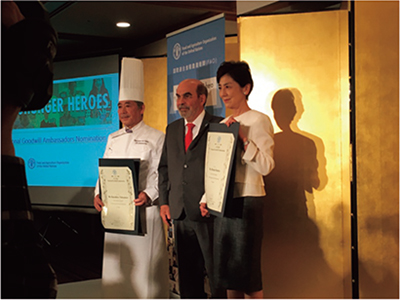 Ceremony for the appointment of FAO's National Goodwill Ambassadors: From left, National Goodwill Ambassador Nakamura, Director-General Graziano da Silva, National Goodwill Ambassador Kuniya (May 10, Tokyo)
Ceremony for the appointment of FAO's National Goodwill Ambassadors: From left, National Goodwill Ambassador Nakamura, Director-General Graziano da Silva, National Goodwill Ambassador Kuniya (May 10, Tokyo)To coincide with Director-General Graziano da Silva's visit to Japan, French chef Katsuhiro Nakamura and journalist Hiroko Kuniya were appointed as Japan's first FAO National Goodwill Ambassadors. After their appointment, they have both played active roles as Goodwill Ambassadors by harnessing their respective experiences. Going forward, as the “face” of FAO in Japan, they are expected to continue spreading information about FAO's activities and the importance of these activities in an easy-to-understand and friendly manner.
Together with the Ministry of Agriculture, Forestry, and Fisheries, MOFA will continue its efforts toward a further strengthening of Japan-FAO relations.
(4) Foreign Direct Investment in Japan
The target to double foreign companies' direct investment in Japan to 35 trillion yen by 2020, addressed in the 2013 “Japan Revitalization Strategy,” was reaffirmed in the “Investments for the Future Strategy 2017.” (27.8 trillion yen as of the end of 2016) With the “Council for Promotion of Foreign Direct Investment in Japan,” which has been held since 2014 to spearhead the initiative to promote activities for discovering and attracting investments, while gathering opinions from foreign company managers, Japan continues to make further progress in implementing additional measures such as regulatory and institutional reforms contributing to the improvement of the investment environment in Japan, responding to the needs of foreign companies, and supporting measures to expand investments effectively. Based on the Five Promises for Attracting Foreign Businesses to Japan18, decided at the 2nd meeting of the Council for Promotion of Foreign Direct Investment in Japan held in March 2015, foreign companies have been utilizing the Investment Advisor Assignment System19 since April 2016, and are meeting with the relevant State Ministers in charge. In addition, the Working Group for Revising Regulations and Administrative Procedures has been convened since August 2016, to review the streamlining of regulations and administrative procedures that pose a challenge to foreign companies when they are investing in Japan. The summaries of the Working Group meetings have also been reflected in the Basic Policy on Economic and Fiscal Management and Reform 2017 and Investments for the Future Strategy 2017.
MOFA has been implementing various measures adopted by the Council for Promotion of Foreign Direct Investment in Japan, initiatives making use of diplomatic resources through diplomatic missions overseas, and trade promotion by key government officials. It is also strategically implementing various initiatives towards promoting foreign direct investment in Japan. The “Contact Points for Direct Investment towards Japan” established at 126 diplomatic missions overseas in April 2016, have been working in collaboration with the Japan External Trade Organization (JETRO), carrying out surveys of requests for improvements to Japanese regulations and systems, calling for investments in Japan by making use of networks of contacts at diplomatic missions overseas, holding events for promoting foreign direct investment in Japan, and implementing other proactive initiatives. The track record of activities at each diplomatic mission one year after the establishment of the “contact points” exceeded 700 cases. Recently, seminars to promote investment in Japan have been organized through cooperation between the JETRO overseas office and the Japanese embassy or local public organization, and such seminars were held in Switzerland in February 2017, Finland in May, and Ireland in June. In Japan, MOFA hosted the Japan-U.S.-Europe Business Seminar on “Ringing in a Renewed Economic Relationship between Japan, the U.S. and Europe Pioneered by Mutual Investments” in March 2017 (organized jointly with the relevant ministries, the Japan Institute of International Affairs, and JETRO). During Prime Minister Abe's visit to the U.S. in September 2017, he introduced the results and future direction of reforms through Abenomics, and called for greater investment in Japan at a meeting with U.S. CEOs and in his economic speech delivered at the New York Stock Exchange.
- 18 (1) Bolstering of the multilingualization of the service in the retail industry, restaurants, medical institutions, public transportation, etc., (2) Promoting the preparation of free public wireless LAN in cities and simplifying procedures for use, (3) creating an environment in which all regional airports are able to receive business jets with short advance notice, (4) support for international students in looking for employment in Japan, and (5) the implementation of the “Investment Advisor Assignment System.”
- 19 A system in which a State Minister will be assigned as an advisor to each foreign company that has made important investments in Japan. A State Minister will be assigned according to the company's field of specialty, and the State Minister for Foreign Affairs will attend all meetings.
Preparations for the Olympic and Paralympic Games 2020 Tokyo have been generating much excitement across Japan. However, are you aware that Japan is also bidding to be the host country for the World Expo 2025? In fact, the public and private sectors of Japan are now working together on activities to pitch Osaka, Kansai as the host for the World Expo in 2025.
In 1970, about half a century before today, the World Expo was held in Osaka based on the theme “Progress and Harmony for Mankind.” It attracted as many as 64 million visitors─the largest number of visitors to an Expo up to that point, and became an Expo that would be much talked about by future generations. That had precisely been the apex of Japan's period of rapid economic growth, and the World Expo, alongside with the Tokyo Olympic Games of 1964, provided Japan with a splendid opportunity to disseminate the new image of postwar Japan to the international community.
This time, the proposed theme for EXPO 2025 Osaka, Kansai is “Designing Future Society for Our Lives.” It places the focus on people, and aims to consider, together with people around the world, the way how each individual can live a happy life, and the future vision for a sustainable socio economy that supports that life. Our approach is to connect the 8 billion people of the world to co-create the society of the future. To realize this aim, we plan to come up with mechanisms that can offer various encounters and discoveries even to those who are not able to come to the venue itself by harnessing technologies to facilitate participation by all the people around the world, such as the Internet and Virtual Reality (VR).
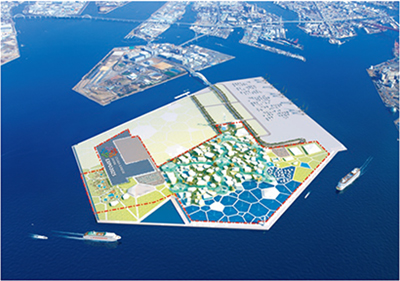 Yumeshima Island, the planned venue for the World Expo. It is a man-made island surrounded by the sea, allowing visitors to enjoy the beautiful scenery of the Seto Inland Sea. Yumeshima Island is easily accessible, about 30 minutes from the heart of Osaka City. (Photo: METI)
Yumeshima Island, the planned venue for the World Expo. It is a man-made island surrounded by the sea, allowing visitors to enjoy the beautiful scenery of the Seto Inland Sea. Yumeshima Island is easily accessible, about 30 minutes from the heart of Osaka City. (Photo: METI)The World Expo is also a venue that provides people with an opportunity to experience new technologies of the future. Technologies such as the moving walkway and mobile phones, which were featured at the last World Expo held in Osaka in 1970, have now become indispensable parts of our daily life. The World Expo 2025 will provide mobility systems that harness self-driving technology which can be used by the elderly and disabled. Health check-up services that utilize Internet of Things (IoT) technology in the pavilions and restrooms that automatically check the participants' health conditions as well as mechanisms that enable participants from around the world to enjoy the World Expo without being hindered by any language barriers using machine translation systems are also under consideration. Participants may even have the chance to experience delivery systems of future societies, such as the delivery of a pre-booked lunch to a specific location using drones.
The host city for the World Expo 2025 will be selected in November 2018. Moving towards that date, we are taking advantage of Japan's attractiveness such as its soft power and are actively engaged in an all-Japan effort to bring the event to Osaka. Pokemon and Hello Kitty, which enjoy immense popularity worldwide, are also offering their cooperation as Special Envoys (Mascot Characters) to bring the World Expo to Japan. Enthusiasm among the citizens is important in efforts to promote Osaka as the host city. We ask for everyone's support towards success in bringing the World Expo to Japan!
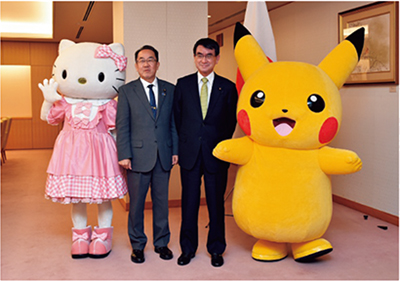 Ceremony for the appointment of Pokemon and Hello Kitty as Special Envoys (Mascot Characters) to bring the World Expo to Japan (November 28, Tokyo)
Ceremony for the appointment of Pokemon and Hello Kitty as Special Envoys (Mascot Characters) to bring the World Expo to Japan (November 28, Tokyo)*You can register as a supporter of Osaka's bid by visiting the following link.



